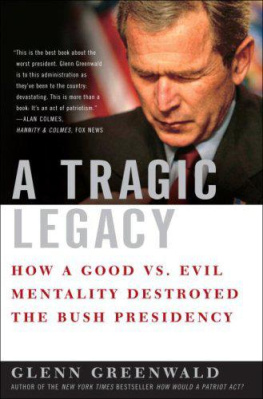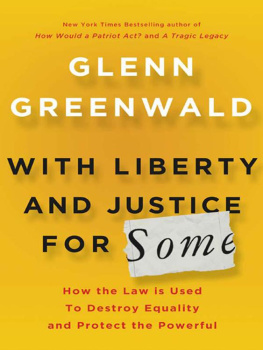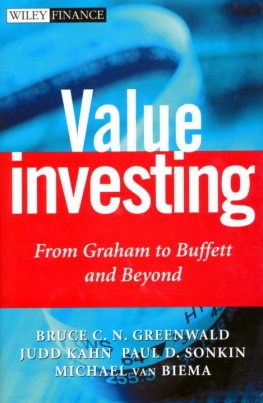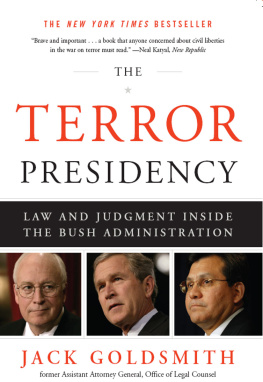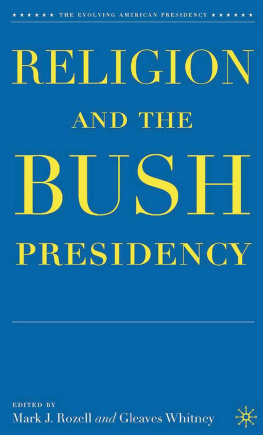Greenwald - A tragic legacy : how a good vs. evil mentality destroyed the bush presidency
Here you can read online Greenwald - A tragic legacy : how a good vs. evil mentality destroyed the bush presidency full text of the book (entire story) in english for free. Download pdf and epub, get meaning, cover and reviews about this ebook. City: New York, year: 2013, publisher: Random House, Inc.;Crown, genre: Politics. Description of the work, (preface) as well as reviews are available. Best literature library LitArk.com created for fans of good reading and offers a wide selection of genres:
Romance novel
Science fiction
Adventure
Detective
Science
History
Home and family
Prose
Art
Politics
Computer
Non-fiction
Religion
Business
Children
Humor
Choose a favorite category and find really read worthwhile books. Enjoy immersion in the world of imagination, feel the emotions of the characters or learn something new for yourself, make an fascinating discovery.
A tragic legacy : how a good vs. evil mentality destroyed the bush presidency: summary, description and annotation
We offer to read an annotation, description, summary or preface (depends on what the author of the book "A tragic legacy : how a good vs. evil mentality destroyed the bush presidency" wrote himself). If you haven't found the necessary information about the book — write in the comments, we will try to find it.
Abstract: What will be the legacy of President George Walker Bush In this fascinating, timely book, Glenn Greenwald examines the Bush presidency and its long-term effect on the nation. What began on shaky, uncertain ground and was bolstered and propelled by tragedy, has ultimately faltered and failed on the back of the dichotomous worldviewgood versus evilthat once served it so well. In A Tragic Legacy, Greenwald charts the rise and steep fall of the current administration, dissecting the rhetoric and revealing the faulty ideals upon which George W. Bush built his policies. On September 12, 2001, President Bush addressed the nation and presented a very clear view of what was to comea view that can be said to define his entire presidency: This will be a monumental struggle of good versus evil. Based on his own Christian faith and backed by biblical allusions, Bushs worldview was basic and binaryand everyone was forced to choose a side. Riding high on public support, Bush sailed through the early War on Terror, easily defining our enemies and clearly setting an agenda for defeating them. But once the war became murkierits target unclear, its combatants no longer seen in black-and-whitesupport for Bush and his policies dropped precipitously. Glenn Greenwald brilliantly reveals the reasons behind the collapse of Bushs power and approval, and argues that his greatest weakness is the same rhetoric that once propelled him so far forward. Facing issues that could not be turned into simple good versus evil choicesthe disaster of Hurricane Katrina, his plans for Social Security reform, and, most ironic, the failed Dubai ports dealBush faltered and fell. Now, Greenwald argues, Bush is trapped by his own choices, unable to break out of the mold that once served him so well, and indifferent to the consequences. A Tragic Legacy is the first true character study of one of the most controversial men ever to hold the office of president. Enlightening, powerful, and eye-opening, this is an in-depth look at the man whose incapability and cowboy logic have left America at risk. From the Hardcover edition
Greenwald: author's other books
Who wrote A tragic legacy : how a good vs. evil mentality destroyed the bush presidency? Find out the surname, the name of the author of the book and a list of all author's works by series.

